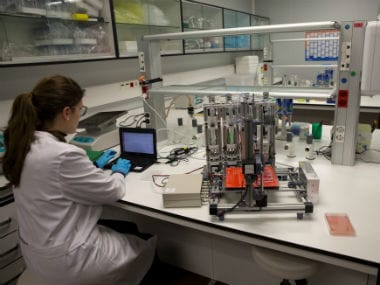Creativity has long been perceived as the domain of emotion-led fields like art, music and writing. Ask people to describe an artist and the names that will figure prominently are probably Mozart, Picasso and Shakespeare. Scientists, on the other hand have been typecast as data-driven, boring technical introverts burning midnight oil, bent over their working tables, with dishevelled hair and stained lab coats. [caption id=“attachment_4264467” align=“alignleft” width=“380”]  Representational image. Reuters.[/caption] Despite popular conceptions being reluctant to paint scientists with the same brush as creatives, creating art or **experimenting through science** aren’t all that far apart. It is true that scientists must follow methods and processes, constantly use data to ensure they are on the right path and validate results through precise measurement, activities that would appear to take the magic out of the creative process. Still, it can be argued that creative processes are the same irrespective of whether the person using the process is an artist or a scientist. In his 1926 book titled The Art of Thought, social psychologist Graham Wallas described the four stages of creativity: preparation, incubation, illumination, and verification. It is the stage between incubation and illumination that involves the most use of imagination. Scientists rarely know answers to questions before they set off in pursuit of them. They value the process by which to get there, which while defined, still needs a leap of faith using imagination before illumination is achieved. No wonder then, that Albert Einstein placed a higher premium on imagination than on knowledge. He didn’t just draw insight not from logic or mathematical formulae, as one would imagine. “When I examine myself and my methods of thought, I come close to the conclusion that the gift of imagination has meant more to me than any talent for absorbing absolute knowledge,” Einstein once told a friend. If we look at the 21st century, Elon Musk and Steve Jobs are great examples of the merit of pursuing diverse interests as a way to gain insights and arrive at unusual solutions to problems. Like Chris Anderson points out in his piece titled The shared genius of Elon Musk and Steve Jobs, that what they did uniquely was not just to develop an intimate understanding of technology and business, but also ‘to imagine the broader ecosystems in which those products could become transformative.’ Science education in our **country** and elsewhere emphasises facts and concepts over imagination and problem solving, leaving little room for the creative thinking, which is central to scientific enquiry. There was a great TED Talk by author and creativity expert Sir Ken Robinson titled Do Schools Kill Creativity? that makes some very valid points. He says that instead of growing into creativity in school, we grow out of it. If science is liberated and taught as a process of learning, observation and of gathering information on natural phenomena that could open the scope for incorporating creativity. If we look back in history, inventions ranging from penicillin to vulcanised rubber to teflon to microwave ovens to Velcro, bakelite and even the X-ray machine wouldn’t have been possible if their inventors hadn’t accidentally discovered them and had the creative ability to see and appreciate their significance. Creativity plays a part not just in discovery but also in the innovative use of a product or idea. Unfortunately, most students think of science as being about memorising complex formulas and solving problems that make little sense in the real world. Inculcating a spirit of innovation and creativity doesn’t always need large systemic changes. Even some small measures can go a long way in boosting creativity. For example, apart from the syllabus, teachers can think of giving students a real-world challenge to solve as a project. Maybe ten minutes can be dedicated at the end of every class to discuss thoughts and updates on the project. Better still, see how science concepts that they have learned in the class room could be used to solve that challenge. The idea is that students make the connection between what they’re learning in class and the real world. If traditional academic reward systems don’t accommodate rewards for creativity or open-mindedness, informal rewards can be equally effective. Calling out creative ideas on a notice board in the class, for example, can be a great idea. These little measures can often go a long way in helping students recognise science for what it is and understand its impact on our world. It is more important than ever for our education systems to embrace creativity, be it in the pursuit of science or any other discipline. The price for failing to do this will be too great for our collective futures. The author is a trustee at Infosys Science Foundation and co-founder of Infosys & Axilor.
Science education in our country emphasises on facts and concepts over imagination and problem solving, leaving little room for the creative thinking.
Advertisement
End of Article


)
)
)
)
)
)
)
)
)



